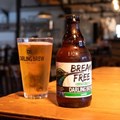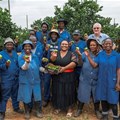South Africa is a resilient country and economy that is open for business and has great potential. These were my thoughts as I recently participated at the 54th Annual Meeting of the World Economic Forum (WEF) in Davos, Switzerland...
Convening 3,000 leaders under the theme “Rebuilding Trust”, Davos is a great global platform for advancing dialogue, cooperation and action-oriented partnership, not only could government, business and civil society immerse themselves in meaningful dialogue, whilst learning from other countries, its great opportunity to position the country’s economic potential to investors.
It goes without saying that this is a critical year, not only for South Africa, but for the rest of the world due to the number of pressing issues such as geopolitical tensions, unemployment, inequality, and climate change. With all these issues one can argue that we are having to navigating a time of polycrisis.
Platforms like WEF therefore, are critical in breaking us from the chokehold of being insular, amongst others, they keep us connected to a global community that can generate new ideas and develop partnerships that can improve outcomes for people, economies, and the planet.
This year, being at WEF was even more poignant for the South African delegation, reminding our partners around the world that as a country we have made some progress in accelerating structural reforms. This vision came to life during SA Night, a beer and food pairing networking event we hosted in partnership with Brand South Africa. The event was attended by 120 guests and led by the Minister of Finance, Enoch Godongwana, where we shared the role that beer plays our country’s economic development.
In the last few years, some of the criticism about WEF was that it is an elite and inaccessible gathering. While some of these criticisms may hold some truth, my experience in Davos this year clarified that the gathering is really what you make of it. Successful participation at the forum is dependent on a delegate’s clarity of action, well-defined goals for the week, and an exacting and exciting engagement strategy.
As Team South Africa, our message was centered on our status as an investment destination and the progress the country is making in economic reforms, particularly in areas of energy, transport and logistics, and fighting crime.
Secondly, we shared about the deep our country is playing in the expansion the Africa Continental Free Trade Agreement (AfCFTA). In landing these messages, we were intent on the world knowing that South Africa remains open for business, investments with a critical role in igniting the African economy.
Beyond engaging on the broad strokes of shifting geopolitics, to the world, we also discussed ‘glocal’ issues such as energy, transport and logistics, water, among others. These are industries that can make or break any economy. Compounding these were local issues that include unemployment, especially youth unemployment, small to medium scale enterprises support, local economies, and more.
I believe that part of the country’s ability to solve for many of these issues sits with the beer economy and value chain – how to leverage our collective power to drive inclusive economic growth in South Africa and the rest of Africa.
According to the Oxford Economist, the beer industry in South Africa supports close to 250,000 jobs, and 1 in 66 jobs in South Africa is a beer job. Further, the research shows that the beer industry added R71bn of gross value add to the country’s GDP in 2019, that is 1.3% of the local economy.
In developing and propelling the beer industry forward, at SAB we are guided by three pillars: sourcing locally, using natural ingredients, and driving inclusive economic growth.
As a leading manufacturer, we have a high local-sourcing ratio. When producing many of our much-loved local and international beer brands, such as Carling Black Label, Stella Artois, and Corona, we intentionally source most of our inputs locally.
Over 95% of the raw materials, such as barley, maize, hops, packaging, cans, glass, and crowns used in our beers, are from local suppliers. This closely links the production of beer to the value chains of other industries, creating jobs and supporting entrepreneurship, collectively contributing R43bn to the fiscus.
The natural ingredients in our beers contribute to a thriving agricultural sector. Over the last 5 years, we have invested over R600m into agricultural developments in South Africa.
We have collaborated with thousands of smallholder farmers, a significant portion of whom are women, empowering them to be agripreneurs through state-of-the-art training and business development initiatives.
Our investments are not limited to farms that produce the raw materials critical in our production process, we are invested in the natural ingredients that align with the beer industry.
For instance, we invested over R19m to help solve the lime shortage we face in the country. We partnered with the Moletele Community Property Association and Komati Fruit Group to establish the biggest lime farm in the country – a true testament to community-private partnerships.
Lastly, the beer value chain is an enabler for inclusive growth. The value chain, including manufacturers, retailers, and points of consumption, supports 1.5% of all jobs in the country. In a nation grappling with chronic high unemployment rates, we place a high emphasis on entrepreneurship and job creation.
Our objective is to foster economically sustainable opportunities that are inclusive and extend to improving the lives and livelihoods of people in the communities we have a footprint in. Our commitment extends to ongoing support for these entrepreneurs and small, medium-sized enterprises through initiatives such as the SAB Foundation and 100+Accelerator programs.
I left Davos feeling energised for the year ahead, ready to tackle problems and opportunities together with my colleagues and our partners. At South African Breweries, we believe in the power of collaboration and partnerships, pooling our perspectives, experiences, and knowledge to solve society’s pressing problems, and my experience at WEF, thanks to Brand South Africa, underscored this principle.
As advocates of the beer economy, we are deliberate and intentional in our belief of the impactful role that the responsible growth of the beer industry can have in fostering inclusive growth, job creation, and community development. Our unwavering commitment to local sourcing, natural ingredients, and inclusive economic initiatives reflects our dedication to shaping a sustainable and prosperous future for South Africa.




































